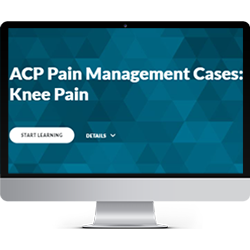Pain Management Learning Series
This interactive training series consists of 7 core modules and 2 sets of case studies.
ACP Pain Management Cases: Knee Pain provides interactive training on assessment and treatment to improve pain, function, and mood for patients with chronic knee pain. By the conclusion of these cases, the learner will be able to:
- Perform biopsychosocial assessment of a patient with knee pain
- Establish a prioritized differential diagnosis for a patient with knee pain
- Formulate a treatment plan for a patient with pain due to knee OA
- Select communication frameworks to enhance patient partnership when communicating about pain and pain management
The 2024 rerelease of ACP's modules within the Pain Management Learning Series includes updated information and provides additional learning and credit earning opportunity for learners who claimed credit for earlier versions.
Modules and CME/MOC credit are free to ACP Members. Non-members may purchase access to claim CME/MOC credit for each module for $25 or the full package of 7 learning modules and 2 sets of case studies for $199 by clicking “Learn More/Buy”. Non-members who do not purchase the module will not receive credit upon completion of the module.
The ACP Pain Management Learning Series is supported by an independent education grant funded by Pfizer, Inc., in partnership with Lilly USA, LLC.
Copyright 2024 American College of Physicians. All Rights Reserved.


